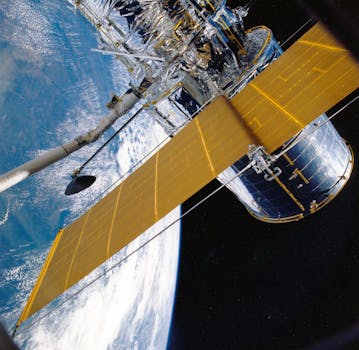
Beyond Earth: How Recent Advances in Satellite Tech are Shaping Global Communications
Beyond Earth: How Recent Advances in Satellite Tech are Shaping Global Communications. The world of global communications is on the cusp of a revolution, thanks to recent advances in satellite technology. For decades, satellites have played a crucial role in facilitating global connectivity, but the latest developments in this field are set to take it to the next level. In this article, we will explore the recent advances in satellite technology and their impact on global communications.
The use of satellites in global communications is not new. Since the launch of the first commercial communications satellite, Intelsat 1, in 1965, satellites have been used to transmit data, voice, and video signals across the globe. However, the early satellites had limited capabilities and were prone to interference and signal loss. The recent advances in satellite technology have addressed these limitations, enabling faster, more reliable, and more secure global communications.
Advances in Satellite Technology
One of the significant advances in satellite technology is the development of high-throughput satellites (HTS). These satellites use multiple spot beams to transmit data, resulting in faster data transfer rates and greater connectivity. HTS satellites have enabled the widespread adoption of broadband internet services, even in remote and underserved areas. Another significant development is the use of advanced propulsion systems, such as electric propulsion, which enables satellites to maintain their position and altitude more efficiently.
The use of advanced materials and manufacturing techniques has also led to the development of smaller, lighter, and more fuel-efficient satellites. These satellites are easier to launch and maintain, reducing the overall cost of satellite communications. Additionally, the development of satellite constellations, such as those launched by OneWeb and SpaceX, has enabled the provision of global coverage and greater redundancy, ensuring that communications are always available.
Impact on Global Communications
The recent advances in satellite technology have had a significant impact on global communications. Satellite communications have enabled the connection of remote and underserved communities, providing access to essential services such as healthcare, education, and financial services. Satellite communications have also enabled the growth of global trade and commerce, facilitating the exchange of goods and services across borders.
The use of satellite communications has also enabled the provision of emergency services, such as search and rescue operations, disaster relief, and humanitarian assistance. Satellite communications have also played a critical role in the provision of navigation services, such as GPS, which is used in a wide range of applications, from aviation to agriculture.
Future of Satellite Technology
The future of satellite technology looks promising, with several new developments on the horizon. One of the most significant developments is the use of quantum satellite communications, which enables the secure transmission of data using quantum encryption. This technology has the potential to revolutionize the way we communicate, enabling the secure transmission of sensitive information across the globe.
Another significant development is the use of satellite-based internet of things (IoT) services, which enable the connection of devices and sensors across the globe. This technology has the potential to transform a wide range of industries, from agriculture to manufacturing, enabling the creation of smart and connected systems.




